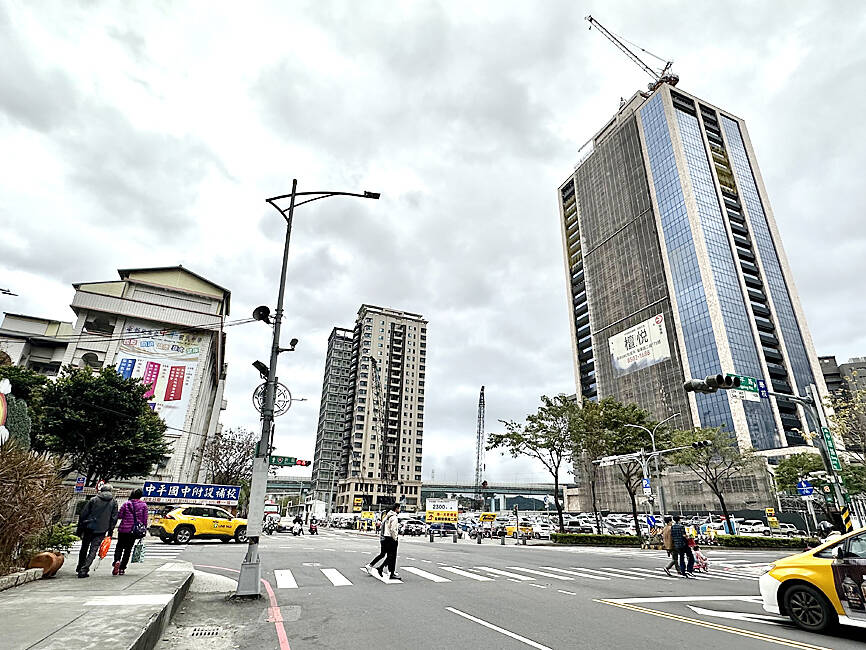Average home prices last quarter topped NT$10 million (US$327,054) in Taiwan’s major cities, despite a slowdown in transactions amid economic uncertainty, Sinyi Realty Inc (信義房屋) said yesterday.
Average home prices surpassed NT$10 million in Taipei, New Taipei City, Taoyuan, Taichung, Tainan and Kaohsiung, as well as Hsinchu city and county, Sinyi said, citing data from the Joint Credit Information Center.
FIRST TIME

Photo: Hsu Yi-ping, Taipei Times
It is the first time the Hsinchu area joined the ranking, indicating that people are becoming more amenable to the price point, Sinyi research manager Tseng Ching-der (曾敬德) said in a statement.
Home prices rose by an average of NT$2.83 million and NT$4.11 million in Hsinchu City and Hsinchu County respectively from October to December last year, compared with four years earlier, Tseng said.
The pace is faster than an average gain of NT$1.83 million in New Taipei City, Taoyuan and Tainan, he added.
“Even though the housing market slowed down in the second half of last year, developers pressed ahead to deliver pre-sale homes and pushed up overall housing prices to record highs,” Tseng said.
Price hikes were most evident in areas where major technology firms launched new plants, creating well-paying jobs, namely Hsinchu, Tainan and Kaohsiung, he said.
A person who buys a NT$10 million home could take out a mortgage of up to NT$8 million, which would translate into monthly mortgage payments of NT$30,000 based on a 30-year mortgage plan with an interest rate of 2 percent, Tseng said.
‘REASONABLE’
The payments would account for a “reasonable” 33 percent of an average annual household income of NT$1.2 million, he said, adding that shorter mortgage durations could lead to unaffordability.
However, sentiment appeared divided over transactions in a poll released last month by Cathay Financial Holding Co (國泰金控), after the Legislative Yuan passed amendments to the Equalization of Land Rights Act (平均地權條例) in January to curb speculation in the property market.
According to the survey conducted from Feb. 1 to 7, the index assessing interest in selling homes fell from minus-19.3 in January to minus-20.6 last month, while the index evaluating willingness to buy homes rose from minus-57.8 in January to minus-54.1 last month.
Additional reporting by CNA

Taiwan Semiconductor Manufacturing Co (TSMC, 台積電) last week recorded an increase in the number of shareholders to the highest in almost eight months, despite its share price falling 3.38 percent from the previous week, Taiwan Stock Exchange data released on Saturday showed. As of Friday, TSMC had 1.88 million shareholders, the most since the week of April 25 and an increase of 31,870 from the previous week, the data showed. The number of shareholders jumped despite a drop of NT$50 (US$1.59), or 3.38 percent, in TSMC’s share price from a week earlier to NT$1,430, as investors took profits from their earlier gains

In a high-security Shenzhen laboratory, Chinese scientists have built what Washington has spent years trying to prevent: a prototype of a machine capable of producing the cutting-edge semiconductor chips that power artificial intelligence (AI), smartphones and weapons central to Western military dominance, Reuters has learned. Completed early this year and undergoing testing, the prototype fills nearly an entire factory floor. It was built by a team of former engineers from Dutch semiconductor giant ASML who reverse-engineered the company’s extreme ultraviolet lithography (EUV) machines, according to two people with knowledge of the project. EUV machines sit at the heart of a technological Cold

TAIWAN VALUE CHAIN: Foxtron is to fully own Luxgen following the transaction and it plans to launch a new electric model, the Foxtron Bria, in Taiwan next year Yulon Motor Co (裕隆汽車) yesterday said that its board of directors approved the disposal of its electric vehicle (EV) unit, Luxgen Motor Co (納智捷汽車), to Foxtron Vehicle Technologies Co (鴻華先進) for NT$787.6 million (US$24.98 million). Foxtron, a half-half joint venture between Yulon affiliate Hua-Chuang Automobile Information Technical Center Co (華創車電) and Hon Hai Precision Industry Co (鴻海精密), expects to wrap up the deal in the first quarter of next year. Foxtron would fully own Luxgen following the transaction, including five car distributing companies, outlets and all employees. The deal is subject to the approval of the Fair Trade Commission, Foxtron said. “Foxtron will be

INFLATION CONSIDERATION: The BOJ governor said that it would ‘keep making appropriate decisions’ and would adjust depending on the economy and prices The Bank of Japan (BOJ) yesterday raised its benchmark interest rate to the highest in 30 years and said more increases are in the pipeline if conditions allow, in a sign of growing conviction that it can attain the stable inflation target it has pursued for more than a decade. Bank of Japan Governor Kazuo Ueda’s policy board increased the rate by 0.2 percentage points to 0.75 percent, in a unanimous decision, the bank said in a statement. The central bank cited the rising likelihood of its economic outlook being realized. The rate change was expected by all 50 economists surveyed by Bloomberg. The